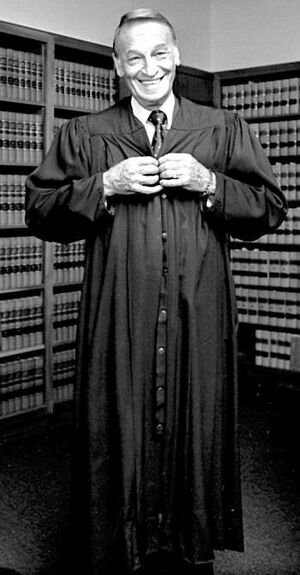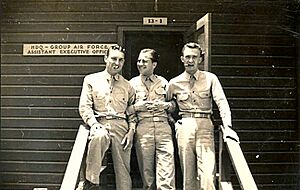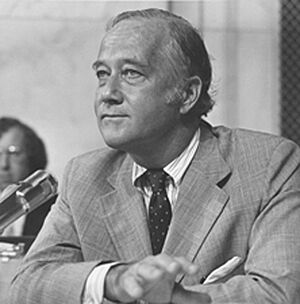Harry E. Claiborne facts for kids
Quick facts for kids
Harry Claiborne
|
|
|---|---|
 |
|
| Chief Judge of the United States District Court for the District of Nevada | |
| In office 1980 – October 9, 1986 |
|
| Preceded by | Roger D. Foley |
| Succeeded by | Edward Cornelius Reed Jr. |
| Judge of the United States District Court for the District of Nevada | |
| In office August 11, 1978 – October 9, 1986 |
|
| Appointed by | Jimmy Carter |
| Preceded by | Bruce Rutherford Thompson |
| Succeeded by | Philip Martin Pro |
| Personal details | |
| Born |
Harry Eugene Claiborne
July 2, 1917 McRae, Arkansas, U.S. |
| Died | January 19, 2004 (aged 86) Las Vegas, Nevada, U.S. |
| Education | Ouachita Baptist University Cumberland University (LLB) |
Harry Eugene Claiborne (born July 2, 1917 – died January 19, 2004) was a federal judge in Nevada. He served from 1978 until 1986, when he was removed from office. President Jimmy Carter appointed him in 1978. Claiborne was only the fifth person in United States history to be removed from office through a special process called impeachment by the United States Congress. He was the first judge to be removed this way since 1936.
Claiborne was born in 1917 in McRae, Arkansas. He studied law at Ouachita Baptist University and Cumberland School of Law. After serving in the United States Army during World War II, he moved to Las Vegas, Nevada. There, he became a well-known defense lawyer. He represented many famous people, including entertainers like Frank Sinatra and Carol Burnett.
He also served as a state assemblyman for the Democratic Party. Later, his friend, Senator Howard Cannon, suggested him to President Carter for a federal judge position. Claiborne became the Chief Judge of the U.S. District Court in Nevada, holding that role from 1980 to 1986.
In 1984, Claiborne was found guilty of not reporting all his income on his tax returns. He spent 17 months in prison. In 1986, the United States House of Representatives voted to impeach him, and the United States Senate then removed him from his job. He always said that the government had unfairly targeted him. After his release, he was allowed to practice law again in Nevada. He passed away in 2004 after dealing with several health issues.
Contents
Early Life and Education
Harry Claiborne was born on July 2, 1917, in McRae, Arkansas. His father, Arthur Smith Claiborne Jr., was a cotton farmer. His mother, Minnie King Claiborne, was a schoolteacher. Harry's father was known for standing up against injustice. For example, he protected an immigrant farmer from a dangerous group, which deeply influenced young Harry.
Growing up, Claiborne was known for his strong speaking skills. He often went with his grandfather to watch court cases in Searcy, Arkansas. This experience sparked his interest in law.
Claiborne attended Ouachita Baptist University. He wanted to go to law school at Louisiana State University. When he wasn't accepted there, he traveled to Tennessee. He met a judge who helped him get into Cumberland School of Law. He earned his law degree in June 1941.
Career Before Becoming a Judge
In 1942, during World War II, Claiborne joined the United States Army. He served in the military police. By 1943, he was transferred to what is now Nellis Air Force Base near Las Vegas, Nevada. His job involved investigating soldiers who were absent without leave (AWOL).
After the war in 1945, Claiborne decided to stay in Las Vegas instead of returning to Arkansas. He quickly got a job as a patrolman for the Las Vegas Police Department. By 1947, he became a lawyer in Nevada. He worked in the Clark County District Attorney's office and later became the chief deputy district attorney. He also served as a state assemblyman in 1948.
After starting his own law practice, Claiborne became a very famous defense lawyer in Las Vegas. He helped create the police protective association and worked to get laws passed that helped police officers and firefighters. He represented many well-known people, including entertainers like Frank Sinatra and Dean Martin for casino issues. He also handled divorces for stars like Judy Garland and Carol Burnett. He even represented some casino owners, like Benny Binion. Claiborne was known for his dramatic style in court.
In 1974 and 1975, Claiborne also worked as a special assistant for the United States Senate Committee on Rules and Administration. This was during important hearings about Nelson Rockefeller's nomination to become Vice President.
1964 Senate Campaign
In 1964, Claiborne decided to run for the United States Senate. He ran in the Democratic primary election against his friend, Senator Howard Cannon. Some people in the party wanted Claiborne to run because they were worried about Cannon's connections to a financial scandal.
Claiborne was seen as a strong challenger because he was well-known in Las Vegas. He had a way of connecting with everyday people. However, his campaign was not well organized. Cannon won the nomination easily. Claiborne came in third place. On election night, Claiborne went to Cannon's headquarters to congratulate him and offer his support.
Becoming a Federal Judge
On July 25, 1978, President Jimmy Carter nominated Claiborne to become a judge for the United States District Court for the District of Nevada. This was suggested by his former opponent, Senator Howard Cannon. Before his appointment, the American Bar Association said Claiborne was "well qualified" for the job.
Claiborne was unique because most federal judges had experience as government prosecutors. He also remained good friends with a former client, Benny Binion, a casino owner. They often ate lunch together. The United States Senate confirmed Claiborne on August 11, 1978, and he officially became a judge. He served as Chief Judge from 1980 to 1986.
Tax Issues and Impeachment
In 1983, Harry Claiborne faced serious accusations. He was accused of not reporting all his income on his tax returns for 1979 and 1980. Prosecutors said he had hidden thousands of dollars he earned as a lawyer before becoming a judge.
At his first trial in April 1984, the jury could not agree, and a mistrial was declared. At his second trial in July 1984, prosecutors focused only on the tax charges. The next month, Claiborne was found guilty of not reporting over $107,000 on his tax returns. He was fined $10,000 and sentenced to two years in prison. He was the first federal judge ever found guilty of crimes while still in office. He began his prison sentence on March 16, 1986, and served 17 months.
Many lawyers and judges in Nevada believed that Claiborne was unfairly targeted. They thought his tax problems would normally have been handled as a civil matter, not a criminal one. Claiborne always said he was too busy as a judge to pay close attention to his tax returns. He claimed he just signed the papers his accountant gave him.
Impeachment and Removal from Office
When Claiborne went to prison, he did not resign from his judge position. This meant he continued to receive his salary. This caused a lot of discussion in Congress, and many felt he should be removed. The United States Constitution states that the only way to remove a federal judge is through impeachment.
House of Representatives Action
On May 22, 1986, a representative from Wisconsin, Jim Sensenbrenner, called for Claiborne's impeachment. On June 3, 1986, Peter Rodino introduced a resolution to impeach Claiborne for "high crimes and misdemeanors." The House Judiciary Committee then approved four articles of impeachment against him. These articles stated that Claiborne had:
- Not reported a lot of income on his 1979 tax return.
- Not reported a lot of income on his 1980 tax return.
- Been found guilty by a jury for filing false tax returns in 1979 and 1980.
- Betrayed the public's trust and damaged confidence in the justice system by falsifying his income.
Claiborne's lawyer, Oscar Goodman, argued that the government had acted improperly in his trial. However, members of the committee said that Claiborne's conviction for filing false tax returns was the main issue. On July 22, 1986, the United States House of Representatives voted unanimously (406-0) to impeach Harry Claiborne. This meant they formally accused him of wrongdoing. He was the 14th federal official to be impeached by the House.
Senate Trial and Conviction
On August 6, 1986, the U.S. House formally presented the impeachment articles to the United States Senate. This began the first U.S. Senate impeachment trial in 50 years. Vice President George H. W. Bush led a ceremony where senators took a special oath for the trial.
The Senate decided to use a special 12-member committee to hear the evidence first. This was a new approach, as all previous impeachment trials had been heard by the full Senate. The committee would gather evidence and hear testimony, then report its findings to the full Senate. This was done to save time. The committee was made up of six Republicans and six Democrats, all of whom were lawyers.
The Senate Impeachment Trial Committee began its hearings on September 15, 1986. Claiborne, escorted by federal marshals, and his lawyers, including Oscar Goodman, were present. The committee chairman, Senator Charles Mathias, tried to follow courtroom rules. After seven days of testimony, the committee presented its report to the Senate on September 30, 1986.
Claiborne's Defense
Claiborne told the Senate committee that he had been unfairly targeted by federal agents. He said he was innocent of willfully filing false tax returns. He admitted his 1979 and 1980 tax returns had errors, but he blamed his tax preparers for these "brutal errors." He claimed he was only guilty of "neglecting my personal affairs terribly."
Senators questioned Claiborne about his knowledge of tax law, especially since he ruled on tax cases as a judge. Claiborne explained that he never handled tax cases as a private lawyer and never filled out his own returns. He also said that while some cases he oversaw had tax issues, they usually focused on other legal points.
Claiborne's 1979 tax return showed less income than he actually earned. He said he told his secretary to send a letter to his accountant correcting the amount. His secretary confirmed she dropped off the letter, but the accountant said he never received it. For his 1980 taxes, Claiborne used a new preparer. He admitted he had a "feeling" something was wrong with that return but didn't look closely until he was accused in 1983.
When asked why he should not be removed from office, Claiborne said, "The biggest danger I can see to the federal court is if ever there be created a buddy relationship between the federal judiciary and the executive branch."
Final Vote and Removal
On October 7, 1986, the Senate heard final arguments. Claiborne and his lawyers argued that using a special committee was against the Constitution because it denied him a full trial before the entire Senate. However, courts had already ruled they could not interfere with an impeachment trial.
On October 9, 1986, the United States Senate voted on whether to convict Claiborne on each of the four articles of impeachment. For a conviction, a two-thirds majority vote was needed.
- Article I (1979 tax return): 87 guilty, 10 not guilty. (Passed)
- Article II (1980 tax return): 90 guilty, 7 not guilty. (Passed)
- Article III (guilty verdict in court): 46 guilty, 17 not guilty, 35 present. (Failed to reach two-thirds)
- Article IV (betraying public trust): 89 guilty, 8 not guilty. (Passed)
Since Articles I, II, and IV received the necessary two-thirds vote, Harry Claiborne was removed from his position as a federal judge. The vote on Article III was important because senators were concerned that saying a court conviction automatically meant conviction in an impeachment trial could set a bad rule for future cases.
Impeachment's Impact
The Claiborne case was historically important not just because he was removed, but because it was the first time the Senate used a special trial committee for an impeachment. After the conviction, Oscar Goodman, Claiborne's lawyer, said that this use of a committee might have "bruised if not broken" the Constitution.
Life After Impeachment
In 1987, the Nevada Supreme Court allowed Harry Claiborne to practice law again in Nevada. This decision seemed to question the federal prosecution against him. Despite his conviction and removal from the bench, Claiborne remained respected in the Las Vegas legal community.
Claiborne faced health challenges later in life. He was diagnosed with prostate cancer in 1990 and had a heart attack in 1991. By 2003, his cancer had returned, and he was also dealing with Alzheimer's disease. Harry Claiborne passed away in Las Vegas on January 19, 2004.
Personal Life
Harry Claiborne was married four times. He had three children with his first wife, Barbara Redfield. He was married for 27 years to his last wife, Norma Ries.
Images for kids
-
Harry Claiborne (right) during the impeachment hearings with his attorney, Oscar Goodman
 | Selma Burke |
 | Pauline Powell Burns |
 | Frederick J. Brown |
 | Robert Blackburn |





